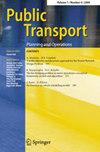Life cycle environmental impact of a high-speed rail system in the Houston-Dallas I-45 corridor
IF 2.3
Q2 TRANSPORTATION SCIENCE & TECHNOLOGY
引用次数: 6
Abstract
The Houston-Dallas (I-45) corridor is the busiest route among 18 traffic corridors in Texas, USA. The expected population growth and the surge in passenger mobility may result in a significant impact on the regional environment. This study uses a life cycle framework to predict and evaluate the net changes of environmental impact associated with the potential development of a high-speed rail (HSR) System along the I-45 corridor through its life cycle. The environmental impact is estimated in terms of CO 2 and greenhouse gas (GHG) emissions per vehicle/passenger-kilometers traveled (V/PKT) using life cycle assessment. The analyses are performed referring to the Ecoinvent 3.4 inventory database through the phases: material extraction and processing, infrastructure construction, vehicle manufacturing, system operation, and end of life. The environmental benefit is evaluated by comparing the potential development of the HSR system with those of the existing transportation systems. The vehicle component, especially operation and maintenance of vehicles, is the primary contributor to the total global warming potential with about 93% of the life cycle GHG emissions. For the infrastructure component, 56.76% of GHG emissions result from the material extraction and processing phase (23.75 kgCO 2 eq/VKT). Various life cycle emissions of HSR except PM are significantly lower than for passenger cars.休斯顿-达拉斯I-45走廊高速铁路系统的生命周期环境影响
休斯顿-达拉斯(I-45)走廊是美国德克萨斯州18条交通走廊中最繁忙的一条。预期的人口增长和旅客流动的激增可能会对区域环境产生重大影响。本研究使用生命周期框架来预测和评估沿I-45走廊的高速铁路(HSR)系统在其生命周期内与潜在发展相关的环境影响净变化。使用生命周期评估,以每辆车/每名乘客每公里(V/PKT)的二氧化碳和温室气体(GHG)排放量估算环境影响。参考Ecoinvent 3.4库存数据库,通过以下阶段进行分析:材料提取和加工、基础设施建设、车辆制造、系统运行和使用寿命结束。通过将高铁系统的发展潜力与现有交通系统的发展潜力进行比较,对环境效益进行了评价。车辆部件,特别是车辆的操作和维护,是全球变暖潜势的主要贡献者,约占生命周期温室气体排放量的93%。对于基础设施部分,56.76%的温室气体排放来自材料提取和加工阶段(23.75 kgCO 2当量/VKT)。除PM外,高铁的各个生命周期排放量明显低于乘用车。
本文章由计算机程序翻译,如有差异,请以英文原文为准。
求助全文
约1分钟内获得全文
求助全文
来源期刊

Public Transport
TRANSPORTATION SCIENCE & TECHNOLOGY-
CiteScore
5.40
自引率
15.40%
发文量
19
期刊介绍:
The scope and purpose of the journal includes, but is not limited to, any type of research in the area of Public Transport: Planning and Operations. As its core it serves the primary mission of advancing the state of the art and the state of the practice in computer-aided systems and scheduling in public transport. The journal considers any type of subjects in this area especially with a focus to planning and scheduling, the common ground is the use of computer-aided methods and operations research techniques to improve information management, network and route planning, vehicle and crew scheduling and rostering, vehicle monitoring and management, and practical experience with scheduling and public transport planning methods. Besides theoretical papers, the journal also publishes case studies and applications. Public Transport addresses transport operators, consulting firms and academic institutions involved in development, utilization or research of computer-aided planning and scheduling in public transport.Officially cited as: Public Transp
 求助内容:
求助内容: 应助结果提醒方式:
应助结果提醒方式:


